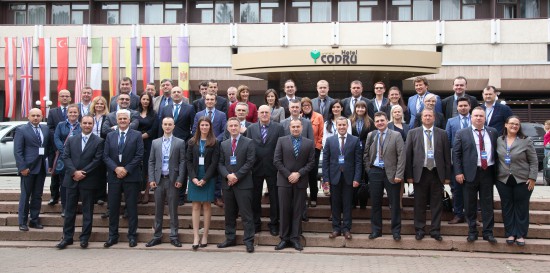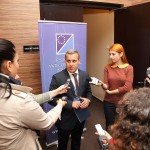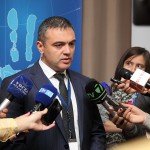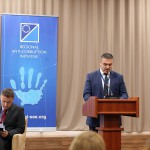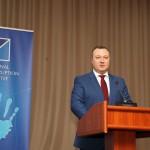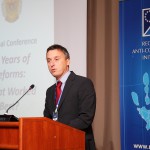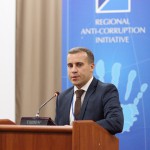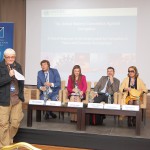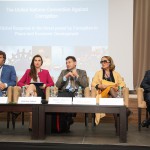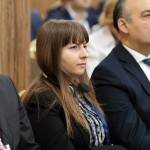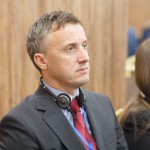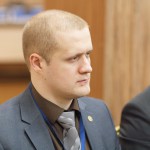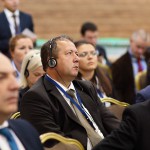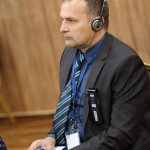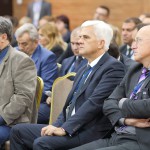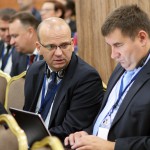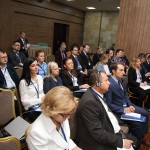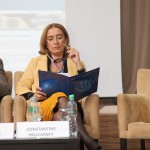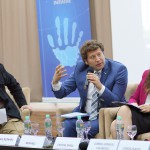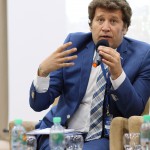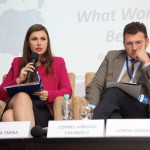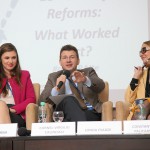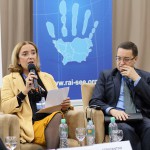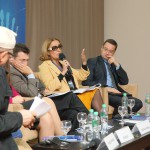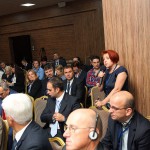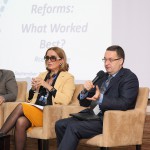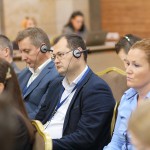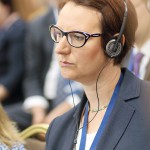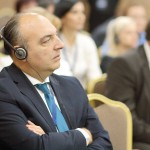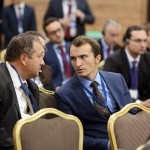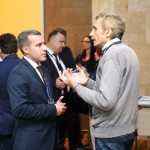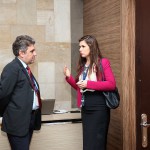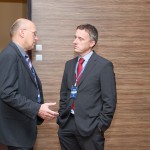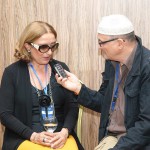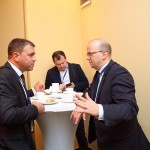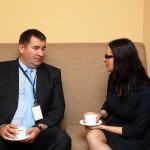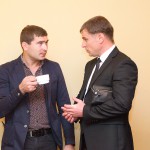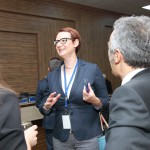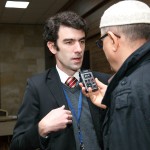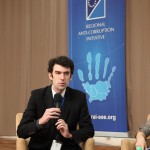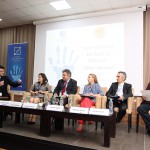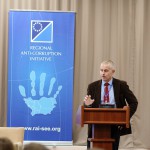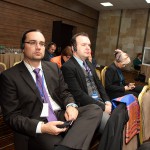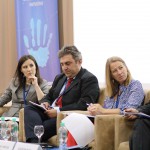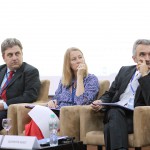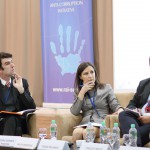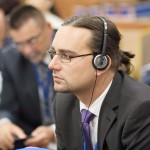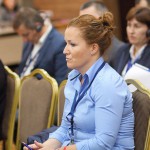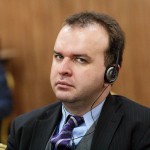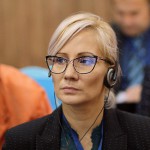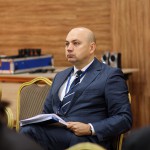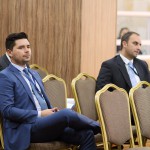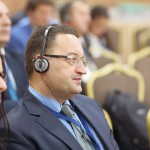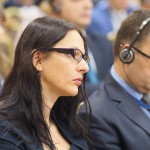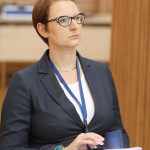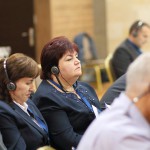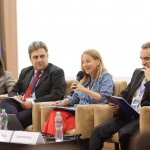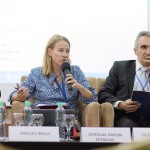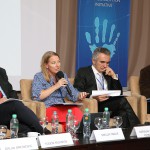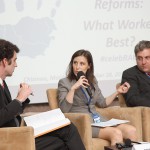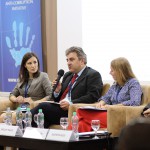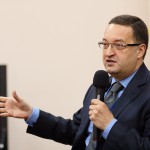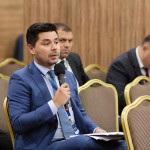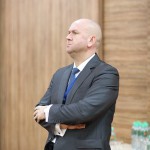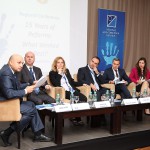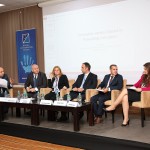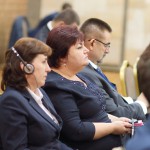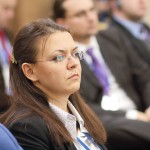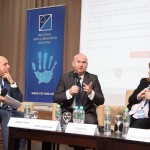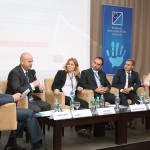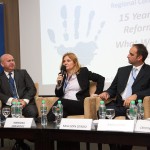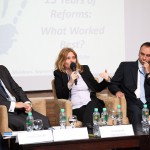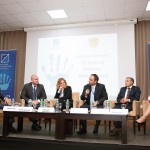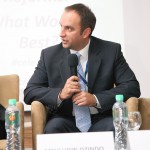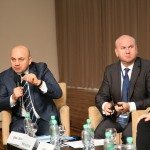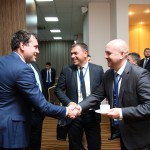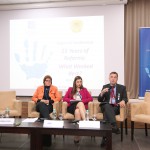15 Years of reforms: What worked best? Chisinau, 28 September 2015
On the occasion of 15 years of Regional Anti-corruption Initiative (RAI),in cooperation with with National Anti-corruption Center of Moldova, RAI Secretariat organized a Regional Conference titled 15 Years of reforms: What Worked Best), in Chisinau, Moldova on September 28, 2015.
More than 60 experts in the field of anti-corruption, media freedoms and justice as well as states and NGOs representatives, all friends of RAI, gathered to review the results of reforms on anti-corruption in Southeast Europe during the past 15 years. The discussion revolved around the challenges faced and lessons learned.
The discussion took place in three panels followed by closing remarks:
Panel 1: Reforming Anti-corruption in SEE: Acknowledging Main Bottlenecks
Panel 2: Ethics and Integrity – a Challenge for Corruption Prone Areas
Panel 3: Innovation vs Classics in Preventing Corruption
Opening of the Conference
Mr. Radu Cotici, Head of Regional Anti-corruption Initiative Secretariat as a moderator of the first session opened the Conference and wished a warm welcome and fruitful day to all the participants.
Opening statements were also made by:
Mr. Viorel Chetraru, Director, National Anti-corruption Center, Moldova: congratulated to RAI on its 15th anniversary. Mr. Chetraru stressed that he is especially proud that Moldova is hosting the Conference. Moldova is in the drafting stage of new national strategy and there are several regional issues and common interests that we identified such as whistle- blowers protection and asset disclosure and conflict of interest. NAC will be working with RAI in these fields. NAC is committed to RAI and regional efforts to curb corruption.
Mr. Corneliu Gurin, Prosecutor General, Moldova: Issue of corruption is a priority in Moldova. This is not an easy struggle since in corruption you fight against yourself. We need all the help and specially cooperation in the region. Our colleagues from the region can share their good practices and experiences.
Mr. Vladimir Cebotari, Minister of Justice, Moldova: great occasion to be in Chisinau celebrating 15 years of RAI. Conservatives estimates of World Bank state that 1 trillion dollars go to corruption annually. Eradication of corruption is our goal. Justice system reform will take us to fair and efficient system. We are developing a zero tolerance culture. Introducing new mechanisms for transparent system. Looking forward to very active and in depth discussion with colleagues from the region
Mr. Davor Dubravica, Chairperson, Regional Anti-corruption Initiative: Thanked Moldova Authorities for hosting the event. Mr. Dubravica stressed that all the countries went through a period of legislative stampede and it was difficult for all segments of Governments. All of our countries suffer pressures from inside and from the outside. The swift reform processes often show lack of knowledge as well as lack of capacities and funds. RAI role was positive in this process – sharing the experiences, identifying common issues and developing common approaches. Curbing corruption never stops and we need to learn how to identify new challenges. RAI wants discussions to reach common ideas and common conclusions about what worked best in the Region.
Panel 1: Reforming Anti-corruption in SEE: Acknowledging Main Bottlenecks
This Session looked into the main barriers that policy makers from SEE encountered when designing and implementing anti-corruption reforms. The obstacles vary from weak political will or lack of capacities, to the independency of anti-corruption actors and (ab)using human rights as an argument to protect the corrupt.
Vasile Botnaru, Director, Radio Free Europe, Moldova – Moderator: Opened the session welcoming the guests and provided a unique poetic insight into the corruption phenomena in the region.
Mr. Constantine Palicarsky, UNODC presented the key notes: UNODC conducted an overview of anti-corruption measures and reforms in the region. Last 10 years showed us that we need to be even more decisive and determined in our work.
We need to learn from the past, countries that failed to establish solid governance structure have disappeared. We forgot that it can happen. Preventing corruption enables functioning of the government. Member states of UN understand this, and as a result of this understanding, UNCAC came as a last instrument in a set of instruments in the Region and worldwide. 177 parties signed UNCAC to date. We have 6th Summit of Countries in November in St. Petersburg.
Transparency is a broad concept and must be clarified. Countries in the region are at their third and fourth generation AC strategies. Some produced results, some not. Why? There was an assumption that if we produce the AC Strategy, or new law, or new Institution there will be drop in corruption. This was a wrong assumption. The real challenge is how to make old institutions aware of their needs to introduce AC measures. Mr. Palicarsky provided more interesting insights and conclusions available in the Presentation.
Discussion proceeded with:
Mr. Idlir Peci, Deputy Minister of Justice Albania: Reflected on the UNODC Presentation. Poor and bad implementation of strategies is a serious danger. Albania is also facing the same problem. Information from line ministries gets collected and strategies are developed, usually poorly budgeted and numerous problems appear. In Albania, Ministry of State on Local Issues holds the competency over curbing corruption. They are capable and skilled Institution, but it is not enough for one institution to be handling and holding all the responsibility. Curbing corruption must be a collaborative effort with measures and actions assigned and adopted by all state Institutions. Further on, Mr. Peci touched upon an issue regarding Anti-Corruption Agencies that can be seen as a pressure point. Independence of AC Institutions can sometimes be misused or misconstrued. AC Agencies can be seen isolated for purpose – so they don’t do the job properly or so that they can be used as a pressure point.
Decentralizing administration also decentralizes corruption. Albania is seeing the same problem – there are about 300 municipalities in Albania and the country is undergoing public administration reform and the number will decrease to 60+. State has also established a public administration school but the key is to have a stable solid administration so that the turnover is not as frequent.
Finally, Mr. Peci referred to disciplinary measures – focus should not be on the disciplinary actions but on prosecution, although the whole machinery of criminal law is much more difficult to move. Prevention is very important as well as enforcement. Fear is the best guardian of the vineyard.
Ms. Cristina Tarna, Deputy Director, National Anti-corruption Centre, Moldova: Agencies must uphold independence and instruments for curbing corruption. UNCAC has set ground rules and even some standards in this respect. Curbing corruption is indeed two steps forward one step backwards process and sometimes even vice versa. Politicians adopt strategies only if they are honest, stupid or under pressure. Since the first two are rare, we are left with having to create pressure or use opportunities when there is an outside pressure created. Establishing the National Integrity Commission was also EU conditionality, meaning pressure. Than process deteriorated. The step forward was restoring the independence of NAC and restoring the NIC competences was also pressured process. Moldova had a new Government in 2009, but the reforms took place 3 years later, there was neither drive, nor political will left to proceed with the implementation. In 2014-2015 – package of AC laws was passed in Parliament.
Ms. Tarna also referred to a human rights perspective, since it can be used as an excuse to diminish the strength of AC policy, this must be taken in consideration when policies are developed. A balance must be found between the best interest of the citizens and human rights.
Mr. Cornel-Virgiliu Calinescu, Ministry of Justice, Romania: Regretfully there is no magic stick for corruption. However, most of the things don’t need to be reinvented and other countries need to be looked at. In Romania we now have a declaration of political will to address corruption. Also, the AC authorities are prompted to achieve the objectives. Having gone without track record in started / settled / sent to court and finally sentenced cases, Romania now has a solid track record, and it will be strengthening further in the future.
“I know you do this like we do, we need to be sharing the experiences and knowledge so that we can learn why there are positive outcomes and not so positive outcomes in different countries.”
Mr. Calinescu also stressed that corruption and crime is done with money and for money. The Government must be equipped to address corruption. Romania recently had a forensic study conducted with persons serving time for corruption. Survey was conducted among 1300 convicted individuals, 300 of them were in prisons and they were able to speak to them. They determined that there is an imbalance of legal instruments and culture and personal values. People don’t see the corruption as a serious issue, they do not feel guilty for speaking to their friend judge, or for hiring their daughter to be their secretary etc. This perception is changing since Romania has recently had convictions regarding cases of nepotism in public office. This will send the message to all public officials in Romania and hopefully move things forward.
Mr. Calinescu finally touched upon the issue of recovery of assets concluding that corruption raises money, this money raises more money and we need to find ways to address it effectively.
Ms. Londa Esadze, Anti-corruption Expert: It is difficult to generalize and it would be more comfortable discussing individual cases or articles. Ms. Esadze stressed her rich knowledge to the region where there are commonalities but each state has its own specific issues. Each anti-corruption institution in the region is unhappy in its own way.
TI Scores of the region in 2014 are considerably worse than rest of the Europe. 70% of EU citizens believe that institutions of EU are corrupt. There is a trend that anti-corruption is becoming a commercialized and so much money is poured into projects and capacities, with what outcome?
There is a need to look at system networks of corruption pyramids. Horizontal and vertical corruption structures. There is a need to address political powers – oligarchies. Corruption and bribery on middle and lower level corruption is tackled but high level corruption and white collar crime is growing.
Ms. Esadze also stressed that significant progress was made in the region in the last couple of years. Law Enforcement Units and AC Agencies are in place in almost all countries and legislation is improving. She concluded by stating that Corruption Prevention is high return investment and we all need to be investing heavily.
Questions & Answers
Mr. Vasile Botnaru, Director of Radio Free Europe Moldova – reflected on what has been said and concluded that corruption seems to be a crime and not a sin in our cultures. Perhaps we need to work on cultural changes and addressing social norms that led us to where we are now.
Ms. Esadze also stated that some nations produce results and some produce impressions. That it is indeed a social and cultural issue as much as a legal one.
Mr. Palicarsky reflected on what Mr. Paci said regarding potential misuse of independence by AC authorities. This issue needs to be recognized and monitored so that institutions do not become tool of abuse or worse, so isolated from other agencies and they fail to cooperate and produce results. Independence is not a goal but a tool.
Very often when we speak of independence it is independence from executives, but agency must be independent from all that it investigates, from economic powers, any sort of undue influence. Influence of organized crime groups and oligarchs is livelier than pressure from the Prime Minister. Key notions to be considered are cooperation, coordination and accountability.
Another question referred to Ms. Esadze was about her presence in Moldova during the justice reform as an expert. The position was that salaries of judges will increase and that will in return decrease corruption. But they continued to be corrupted. Ms. Sadze gave a direct answer stating that if there is a chance for a official to gain 20K or more per month than increase in regular salary is not that relevant.
Panel 2: Ethics and Integrity – a Challenge for Corruption Prone Areas
This Session focused on challenges related to transparency, codes of conduct and integrity risks in the most corruption affected areas, such as politics, judiciary, healthcare or education. The panellists deliberated on the best ways to reduce corruption, based on the lessons learned in the past 15 years, in the areas vulnerable to corruption.
Mr. Pedro Gomes Pereira, Senior Specialist, Basel Institute on Governance moderated the session.
Mr. Quentin Reed, Anti-corruption Expert presented the key notes. Mr. Reed pointed out that we can ensure that the conduct is and will be good only when public officials believe that corrupt practices are wrong. Incentives that promote good conduct must also have a part in the process. Problem is how we get from here to there. It is evident that we will have to deal with many more issues than monopoly and political pressures.
It is also evident that there are numerous codes, meaning legal provisions, meaning laws that regulate the area of ethics. We must realize that there should be positive codes of conducts, since not all situations can be legally described to detail. Region needs to look at any sector specific issues but also sectors need to be examined in the wider context. Technical assistant has not caught up to this yet. For more details, please download the outline.
Moderator Mr. Pereira also raised the question of how can we use the prevention tools more effectively since we are called in when something goes wrong.
Discussions proceeded with:
Mr. Todor Yalamov, SELDI / CSD Bulgaria: procedural ethics are coming forward. What is unethical in London is standard in Sofia. In Macedonia there was a massive culture of bribing teachers. Our societies differ so much. It is important to recognize that some actions have a systemic impact on the whole society. For example open data can prevent corruption. Prevention can be turned into enforcement if all citizens are utilized to act.
Probably in 5 to 10 years prevention will equal enforcement if there is enough technology and data available and if citizens are used to raise misuses.
Ms. Shelley Inglis, UNDP Istanbul Regional Hub: UNDO is working in sectors. Ownership of anti-corruption must be by all professionals in their respective sectors. There is evidently more traction for anti-corruption efforts. This is a positive sign. UNDP has its traditional sectors such as health, education, water. There are some specific examples in each of these sectors.
In Serbia we had success with working with health centres since patients did not know their rights. Informing the citizens has empowered them to demand service and not resort to other options.
Moldova – work with 22 high school to develop innovative solutions to addressing corruption. Competition was organized with awards for most innovative idea. This was done with the purpose to educate youth and to turn attention to the ethics.
Uzbekistan – water management system. Collection revenue towards new billing system. UNDP helped authorities to introduce a fairer and less corruption prone billing system for citizens. These are some sector examples.
UNDP also had positive examples of interventions at the local level – In Macedonia Code of Conduct was developed for municipal workers together with the local authorities. Trainings for administrators and civil servants were instigated. In Djakova Municipality, Kosovo, an open procurement data system was put in place ensuring transparency of the procurement system. Open data is indeed another way, a tool to address corruption. Open data platform for the region was established this year.
Mr. Zorislav Antun Petrovic, Anti-corruption Expert: started by stating that in principle nobody wants to be a thief. In Croatia, when soccer teams play, referee cannot be from their towns. Is this right since not all people from one town support one team? This seems to be a cultural norm. But politicians’ brother bidding for a contract in his institution seems to be OK. This behaviour is not seen as a conflict of interest. So conflict of interest can have different meaning in different spheres of life.
We had so much difficulty to make assets declarations public. Today Croatia has one of the most sophisticated laws in the world and data is in most cases very visible. Encouraging trend is that people are paying much more attention to conflict of interest today than in the recent past. We need to enable public officials to be responsible and to want to meet public expectations.
Ms. Dalija Oreskovic, President of the Commission for Resolution of Conflicts of Interest, Croatia: stated that we all have similar conflict of interest institutions. Prohibition in sitting in management and supervision boards have been implemented in all countries. Croatian Commission has power to issue sanctions. The Law also describes what conflict of interest is, this is very important. Track record is good and public responded positively.
On the other hand, some decisions read that official did not behave ethically but Commission cannot pass sanction in this respect since there is no adequate sanction prescribed. This situation is something we need to work on and improve.
Ms. Oreskovic also posed a rhetorical regarding the code of conduct – the debate will show how it was done in practice. Do we focus on citizens and public or do we have an institution to pass the rulings? In one year Commission exceeded the tract record of all previous Commissions put together. But we need to push forward with concepts that need to be addressed. Unethical behaviour being the key – what is the experience of other countries. We need institutions that will promote positive, good behaviours. There has to be multiple approach that will include different institutions. One institution alone cannot make a long-lasting impact.
Mr. Reed also added that corruption happens in the context of institutions. Organizational culture is also key to this behaviour. If the organizational culture in some institutions is that corruption is not accepted and is not a norm there will be very limited corruption. In other organizational cultures peer pressure is so strong and if you do not engage in corruption you become an outcast. We do not sanction people who are in conflict of interest. We sanction people who do not disclose conflict of interest and who do not manage the conflict of interest.
Leading by example – if managers are not example than staff will not follow.
Silviu Popa, National Integrity Agency Romania: gave a Romanian example of conflict of interest – from 2007 to 2012, Agency identified 22 cases of members of Parliament hiring relatives as Cabinet staff. After investigations were finalized, Agency issued a public statement and sent the cases to Prosecutor’s office. Media went to parliamentarians, and they did not see the problem in hiring a daughter as a secretary since it is a trusted person. They failed to understand the gravity of the offence. After several months prosecutor sent the files to courts. Prison time with suspension from 6 months up was sentenced in most cases.
It can be concluded that if you do not have an impact than you cannot talk about efficiency of AC policy. Since Romania had different policies but nothing happened until the Agency was established.
Panel 3: Innovation vs Classics in Preventing Corruption
The session tried to answer What Worked Best in the last 15 years, examining the effect of common preventive policies, such as management of conflict of interest, codes of conduct, or public procurement, as well as those of relatively new for SEE prevention measures, such as corruption proofing of legislation or integrity testing.
Moderator: Mr. Sergiu Ostaf, Director, Resource Center for Human Rights, Moldova
Keynote Address: Ms. Cristina Tarna, Deputy Director, National Anti-corruption Center, Moldova – introduced the topic by delivering a presentation on Innovation versus Classics in Preventing Corruption. She emphasized the importance of prevention and that it should be treated with the highest priority. The reality is that an agency can have only 1% of actual corruption investigated, while the 99% remain un-investigated. The 1% that is investigated has to be carried out in a way to impress the public and to prevent other potential corruption crimes happening. So, are the classics in prevention enough to have this done? Ms. Tarna emphasized that UNCAC provides a wide range of classic corruption prevention tools that need to be used in order to have long-term effects and results, but the experience shows that these are not enough and that there are many bottlenecks, including lack of commitment on behalf of a corrupt public administration, lack of outside supervision on fulfillment of prevention requirements, lack of sanctions, and the opinion that prevention should not cost money. So, having these bottlenecks in mind, how to innovate? Ms. Tarna gave response to this issue by answering three questions from a classical and from an innovative perspective:
- Can we determine public administration to behave? – classics predicts ethics as a prevention tool in this regard, while the innovative approach would use corruption risk assessment (CRA) as a tool. Speaking of CRA, Ms. Tarna mentioned methodology on corruption risk assessment that was developed in cooperation with RAI. The Methodology has a regional approach, and therefore takes into account different conditions, circumstances and assumptions, while offering a wide number of approaches and paths to take when introducing CRA in national agendas
- Can we predict future corruption risks? – classics advocates surveys and conflict of interests regime as a tool for prediction, while corruption proofing of draft laws is being used by countries as an innovative and effective tool in predicting and preventing future corruption. Ms. Tarna highlighted the Methodology on anti-corruption assessment of laws developed in cooperation with RAI as a comprehensive tool in this regard.
- Can we motivate public officials to break the corruption chain and report on the bribe givers? – classical approach to prevention predicts whistleblower protection and good faith as a tool, while the integrity tests are being used as an innovative tool to break the corruption chains and prevent corruption. As a good basis in this regard, Ms. Tarna emphasized Whistleblower protection in South East Europe: an overview of laws, practice and recent initiatives publication developed by RAI.
In the end, Ms. Tarna stressed out that innovative tools are effective and proved to be giving results, but that they need to be innovated as well. In other words, all new tools need to be continuously improved and adjusted with gained experience and to all counties’ needs. For more details, please see Ms. Tarna’s presentation.
Discussions proceeded with:
Mr. Pawel Wojtunik, Head of Central Anti-corruption Bureau, Poland: Presented the work of Central Anti-corruption Bureau (CAB) of Poland, emphasizing the fact that they have become champions of online education. Mr. Wojtunik highlighted that CAB implements online training, online education tools and social media as an innovative approach to reaching their target group, educating and training people in the field of anti-corruption, and therefore contributing to prevention of corruption. Mr. Wojtunik continued his speech by presenting educational website the CAB has developed, containing audio and electronic books and having millions of visits per year. Also, CBA has a comprehensive e-learning/training platform, dedicated to representatives of public administration, business, and youth and having different learning topics and modules. The CAB has trained more than 33,000 public officials until the day and from the experience that they gained, can say that this approach to anti-corruption is not only innovative, but effective and cheap as well.
Ms. Marijana Obradovic, Assistant Director of Anti-corruption Agency, Serbia
Ms. Obradovic gave a brief introduction on the work of Anti-corruption Agency (ACA) in the light of innovative approaches to corruption prevention. Corruption risk assessment as a tool for corruption prevention has been used and advocated the Agency in the recent years and they have very good results. The Agency developed 69 models of integrity plans, suitable for different institutions and provided trainings to public institutions on what model to employ, how to use it, and assisted them all the way through process. During the 1st cycle, more than 2000 public institutions in Serbia have developed their integrity plans. Also, as part of the obligation, they had to go through quality assessments and external assessments. The Agency has made high number of field trips in assessing the quality of the integrity plans, and it has been diagnosed that these plans do not meet quality criteria. Consequently, this issue needs to be worked on in the future. All institutions need to understand that corruption prevention is their own job, not exclusively the job of the Agency. Therefore, changes need to come internally in order for integrity plans as a powerful tool to have its effects.
Mr. Mevludin Dzindo, Assistant Director of the Agency for Prevention of Corruption, Bosnia and Herzegovina:
In the opening of his speech, Mr. Dzindo presented Strategy for fight against corruption for the 2015-2019 period developed by the Agency. Also, he emphasized that Bosnia and Herzegovina has adopted the whistleblower protection law at a state level, and that this law is one of the solutions to the problem wide spread corruption and lack of trust in public institutions. In the light of this law, Mr. Dzindo emphasized state-registered and protected whistleblowers as one of the success stories from Bosnia and Herzegovina. Answering the “What worked best?” question, Mr. Dzindo highlighted that it is crucial to have action plans for implementation of national strategies for fight against corruption. These plans need to be concrete operational documents that turn the Strategy into specific activities to be implemented.
Mr. Radu Cotici, Head of RAI Secretariat:
Mr. Cotici gave an overview of regional trends when it comes to classical versus innovative approaches to corruption prevention. He emphasized that there are numerous studies touching upon both classical and innovative anti-corruption tools. In this regard, classical tools are those that advocate monitoring as a tool for prevention, while corruption risk assessment and corruption proofing of laws are considered as innovative tools and trends. Speaking about the region of Southeastern Europe, Mr. Cotici highlighted that the region has tried and experienced all types of classical tools with less or more success, and that it is surely turning towards innovative tools. The experience shows that both classical and innovative tools have their strong potential in prevention, but it is the strong and shared will and commitment that is a crucial and decisive condition that has to be in place in order for those tools to be effective and bring long-term results.
Conclusions and Closing Session
Conclusions: The challenges the region is about to face and the possibilities to address them
Ms. Cornelia Abel, Transparency International was a key note speaker: Western Balkans has a range of challenges in the field of corruption. The key ones revolve around good governance and we all have a pretty good idea by now of what should be done.
There are number of key issues that are very much shared and those are:
Governments and political parties – political power has an undue influence on all branches of government.
The relationship between the public and private sector – domestic business powers have a significant power over government decision, at times they are even controlling the institutions.
Gross weakness of the two other pillars of state, the judiciary and legislative. We have a recent example from Montenegro whereas Government is not complying to Parliament decisions. There is an example from Serbia where the Prime Minister told the MPs that they will “eat, sleep and wash” in the Parliament until they pass all the reform laws planed by the Government.
Ms. Abel proceed with stating that there are some good news too. Welcoming and positive trends are setting up of independent institutions such as Commissions, Ombudspersons, and Agencies. All of the new institutions exercise relative independence, and capability to tackle issues at hand. It also recognized that their decisions can be sidelined and they are often not close to decision making process.
There are two more trends that need to be stressed out:
- Trend towards media in the region is not good at all. The ownership of media is under attack as well as their role is minimized. There are numerous growing examples from the region where journalists were attacked, threatened, prosecuted etc.
- Global trend of limited space for civil society. These attacks are more sophisticated and targeted. There are recent examples from Macedonia and Serbia.
Media and Civil Society play a key role in a democratic society. Without media and civil society it is impossible for governments to and institutions to operate for and with citizens, which is the essence of democracy.
Ms. Abel pointed out that she referred to a handful of challenges and that there are others that need to be reflected as well.
Addresses:
Mr. Davor Dubravica, Chairperson, Regional Anti-corruption Initiative
Thanked the participants for active and constructive attendance. Mr. Dubravica expressed his gratitude to Moldova and its authorities for hosting this important event. RAI will continue its efforts, will continue to organize gatherings that will bring us closer together, and he promised that RAI will deliver new things and new ideas to its member countries.
Christina Tarna, Deputy Director, National Anti-corruption Center, Moldova: NAC is honoured to have hosted the Conference in Moldova. Ms. Tarna is especially glad that her colleagues from the NAC had an opportunity to be exposed to this interesting experiences. She also thanked RAI for keeping an eye on all the countries and stressed that NAC is and will be using all of the materials produced by RAI. Ms. Tarna used the opportunity to thank the interpreters and concluded her address by stating that she is looking forward to many other RAI birthdays and a message to all the participants: Reform! Dare! Innovate!
Please download List of Participants and final event Agenda for more details.
Photo Gallery

